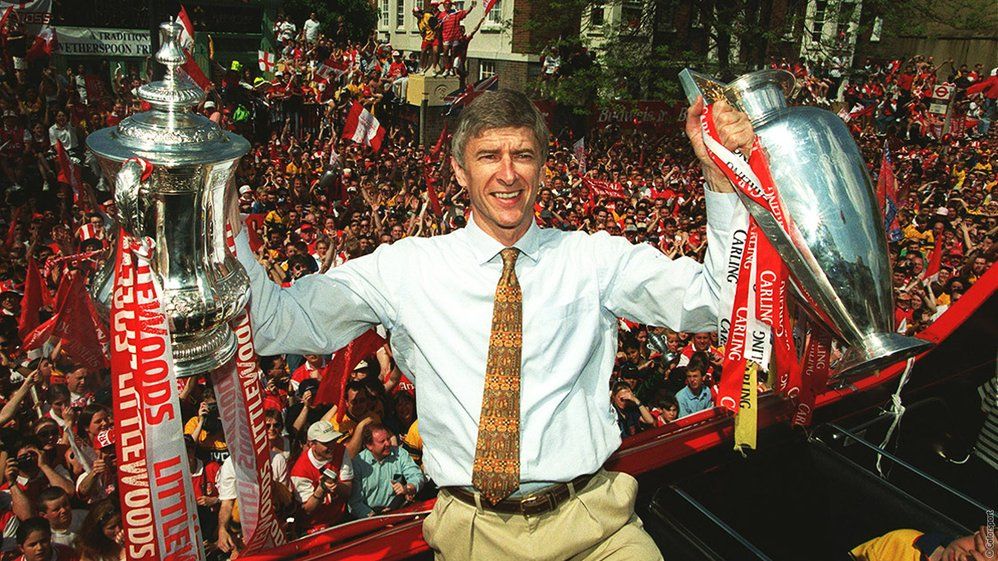The Philosopher of Football - Arsene Wenger
11 Apr 2020 [football For a sport with a premise as simple as putting a ball into a net, football has played an important role in shaping society. What occurs on the field often leaves an impression on areas far away from the stadium – science, maths, and even politics have found themselves impacted by the beautiful game. Even though only twenty-two people take the field at a time, there is an infinite number of ways in which in the game can be played – over the years, this has resulted in the creation of various styles – or “schools of thought” – of football. A manager’s “philosophy” is a common blanket term often used when talking about their preferred playing style, or the qualities of players they favour. In other words, how they believe the game should be played, or what they feel gives them the greatest chance of winning.
But is it possible to take these beliefs and look at them from a more traditional philosophical standpoint? Do football managers have something in common with some of the greatest thinkers on Earth?

If one was looking to build a bridge between football and philosophy, they don’t have to look any more further than Arsene Wenger. A radical footballing mind, he singlehandedly brought English football into the modern ages by revolutionizing how athletes maintained themselves off the field. He made callisthenics, yoga and improved diets a staple of match preparation and recovery, and these measures were quickly adopted by his competitors after seeing the improvement that it had on the Arsenal players’ performance. The style of football he preached was eye-catching: at their best, Arsenal was a beautiful jazz orchestra, running a fluid offence with the help of technically gifted players.
How to Play The Beautiful Game
Wenger always wanted his teams to play with creativity and freedom, unwavering with his style over his long managing tenure. He believed that football was something greater than a sport, a means of entertainment and expression. In this regard, he shared his views on creativity with Nikolai Berdyaev.
“Only he who is free, creates.”
Berdyaev’s definition of creativity transcends most conventional definitions – not creating artefacts, but rather, he postulates that it is the bridge between God and man itself. For him, creativity can transcend the physical world, and into the spiritual world. Just as how God made something from nothing, humans, by extension, can bring something unique into this world using materials found around us.
They would also agree on why creativity is important. Wenger looked to play attacking, expansive football because he believed that the sport had “a responsibility to entertain”. This is because football is the sport of the middle class, who flock to stadiums on weekends to escape the monotony of their daily lives.
That is basically what I tried to do – to give people an experience in life that is not everyday.
Berdyaev placed the same importance on creativity, stating that it takes us from a “dull, everyday life” to the “realm of a transformed world”. If Berdyaev ever came to the Emirates, or London Colney, Arsenal’s training ground, to speak with Wenger, he would find that they see eye-to-eye on a lot of things.
The “Facilitator”
Throughout his tenure at Arsenal, Wenger had a unique strategy of investing in young players in undervalued markets and developing them into superstars. This allowed Arsenal to become a financially stable club; while allowing them to entertain and compete in the long run.
His coaching style, however, was even more uncommon. While other coaches looked to play within a system with strict guidelines, he referred to himself as nothing more than a “facilitator” for his players:
“Religiously, it is said that God created man. I am only a guide. I allow others to express what they have in them. I have not created anything. I am a facilitator of what is beautiful in man.”
The role of the “facilitator” in player development and coaching is similar to the role of Socrates in his lectures with students. The Socratic method of question and answer involves a dialogue between the teacher and the student. However, what makes this dialogue unique is that there is no predetermined outline for the dialogue, no stipulated endpoint, and there is equal impetus on the teacher and the student to propel the discussion.
I find that there are similar aspects with the Socratic dialogue and coaching players – in the sense that players need to be able to account for themselves. Coaching is also a two-way process in terms of learning, and the coach also must be open to learning something himself. Wenger as a coach was not aloof – rather, he operated on a system of mutual respect. If he ever entered the field of education, I could see Wenger using this system a lot to educate his students.
It was interesting to see how some principles of philosophers translate to the beliefs of football coaches, and how easy it was to find parallels between the two despite the very different nature of these fields. I’ll definitely be exploring this topic more in the future.